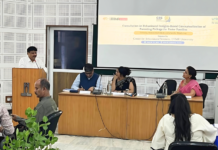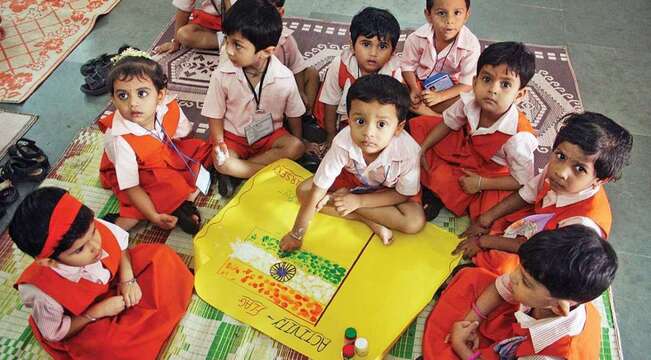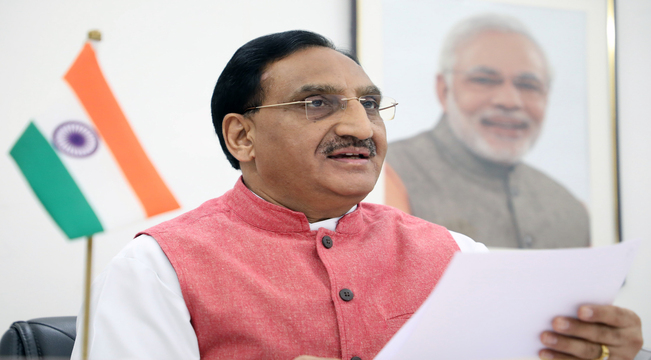- Implementation of Bharat Net will help Digital University make education accessible in rural areas
- Digital University will aim to increase Gross Enrolment Ratio from 27% to 50%
New Delhi, February 22, 2022:The proposed Digital University is a step in the right direction and will position India as a world leader in virtual education and has the potential of increasing the Gross Enrolment Ratio (GER) from 27% to 50%, said India’s leading education experts during a webinar organised on Monday by Ministry of Education, Government of India.
The webinar Digital University: Making World Class Higher Education Accessible for Allwas a part of the Ministry of Education’s ‘Achieving Atmanirbharta through the Amrit Mantra of Digital Education and Dynamic Skilling’that was held today and was aimed at engaging with stakeholders on the implementation of Budget 2022 in the education sector.
The webinar was moderated by Prof. Anil Sahasrabudhe, AICTE Chairman, and saw the presence of eminent panellists Dr. Swati Piramal, Vice Chairperson, Piramal Group, Prof. V Kamakoti, Director, IIT Madras, and Prof. M. Jagadeesh Kumar, Chairman, UGC. The Chair and Co-Chair of the meeting were Shri K. Sanjay Murthy, Secretary, Higher Education, and Shri K. Rajaraman, Secretary, DOT.
The panelists emphasized on the need for Multi-lingual, accessible Learning Management System, creation of engaging, immersive learning experiences, linking peer learners to create strong learning communities and synchronised, experiential learning by blending online education with physical mode (phy-igital).
In his opening statement, Shri Rajaraman said that implementation of BharatNet will make education accessible and affordable through the Digital University.
“BharatNet will eventually cover 6 lakh villages in India and will provide high-speed broadband to rural India. The architecture that we will have will enable learning for different segments of the society for college and certificate level learning. We believe that BharatNet will act as a vibrant hub and with active collaboration with the AICTE and State Governments we can maximise the onboarding of millions of students to Digital University,”said Shri Rajaraman.
Shri K. Sanjay Murthy, Secretary, Higher Education, hoped that a Digital University coupled with high-speed net connectivity will aim to increase the country’s GER by two-fold.
“With the kind of infrastructure that we are expecting, we are hoping to increase the Gross Enrolment Rate from 27% to 50% as laid out by the NEP. This means we will have an additional 10 million students in the higher education system. The GER of tribal students is much below the national threshold. We need to increase the rate of this segment along with the women population of the country,” said Shri Murthy.
Stressing the need for a Digital University that provides access to all, Dr. Swati Piramal, Vice Chairperson, Piramal Group, said that it could prevent girl children dropping out from the school system.
“Online education across the globe witnessed a great spike due to COVID norms but the solution must be unique for our country. We know many girl children have dropped out of school even though they had access to digital education. Apart from children education, digital universities are important in healthcare to train ASHA workers, adult education, and upskilling. The only way we can do it in change management and involved people on the ground. Piramal education University have 5000 young people who are doing groundwork and it has been successful working with NITI AYOG, the Government and having experience in rural areas for reskilling where it needed most. We really look forward to implementing aDigital University which can change the lives of young girls and people of our country.”
Prof. V Kamakoti, Director, IIT Madras, said that if colleges get affiliated to a Digital University it would be lower the access barriers.
“We actually understand certain access barriers in a much clearer way and we were able to address access barriers. For instance, we are trying to get such a local chapter which can bring these people together that can become a sort of a very interesting thing in the Digital University also, colleges can get affiliated to the Digital University.And it can admit students to the local program and provide local support to local students,” said Prof.Kamakoti.
Prof. M. Jagadeesh Kumar, Chairman, UGC, said that the government is working to bring in regulations that will enable them to work with ed-tech companies to enable students in distant areas to become outstanding learners and contribute to the country’s economic growth.
“India is ahead of the curve in terms of the educational technology there is an enormous talent within our own country either in terms of ed-tech and start-up companies that are coming up. As per regulatory reforms that we are bringing in universities will be able to have collaborations with ed-tech companies and utilise their cloud platforms, technological facilities they have in terms of animation, visual effects, gaming, comics to create high quality digital contents to enable these students to become outstanding learners and contribute to the economic growth to our country,” said Prof. Kumar.
Prof. Sahasrabudhe also stressed that increasing the Gross Enrolment Ratio cannot be possible done by the brick-and-mortar universities.
“Digital education is a way of reaching out to those who are unreachable in remote areas, villages, and mountainous areas. For them, it is very difficult to move to cities for quality education as it will put a lot of pressure on their living expenses. Digital University is one of the best things that has happened to India under the Digital India initiatives,” said Prof. Sahasrabudhe.
The vision of Digital University will be to increase access to quality higher education programmes through the innovative use of ICT tools and platforms. The Digital University is proposed in a hub and spoke model, wherein Digital University will be the hub and many top higher education institutions within and outside the Country as its spokes.
The Digital University will be offering programmes at Degree, Diploma, and Certificate levels either under its umbrella or in collaboration with the spokes. The Digital University ecosystem will have three important components viz. Technology Platform provider, Digital content creator, and Higher Education Institutions (HEIs) with the Digital University at the core of the ecosystem.
Corporate Comm India (CCI Newswire)


































